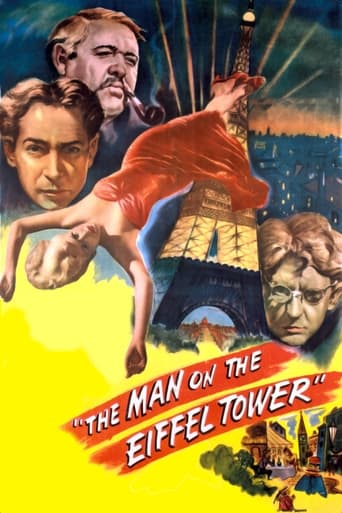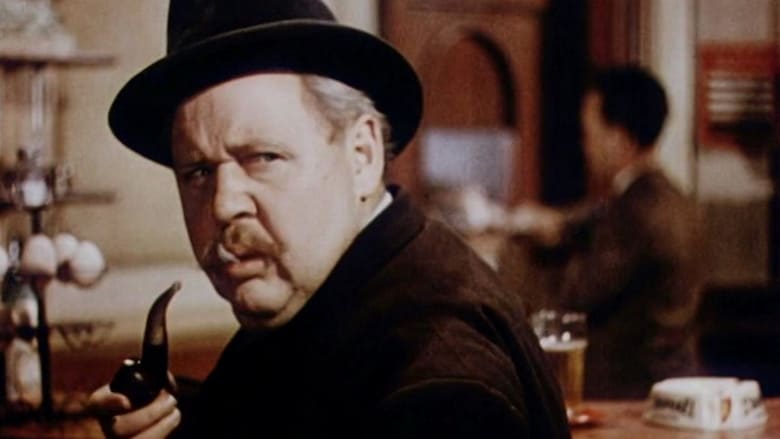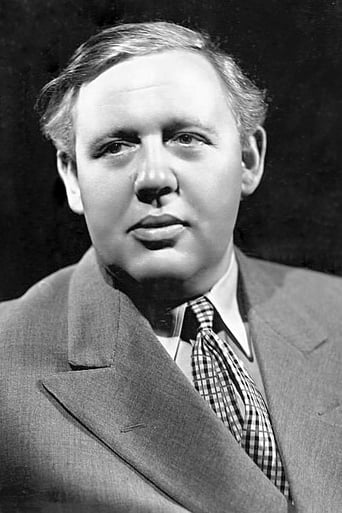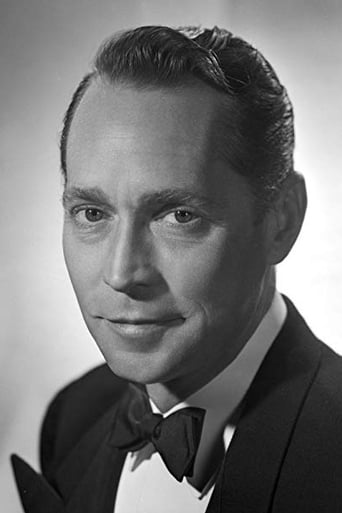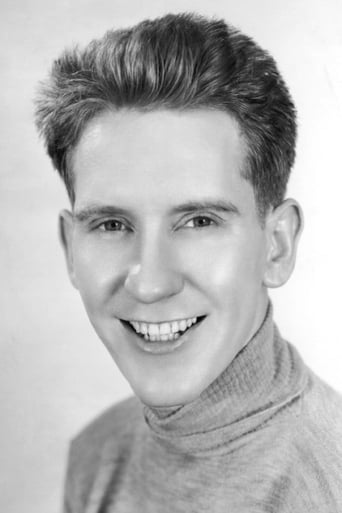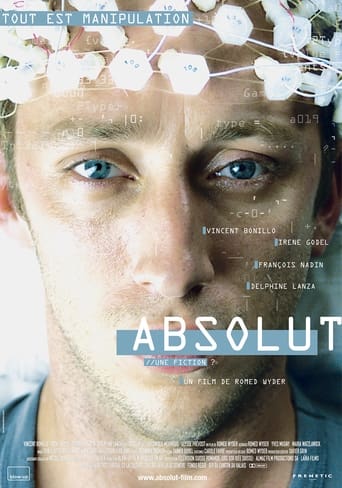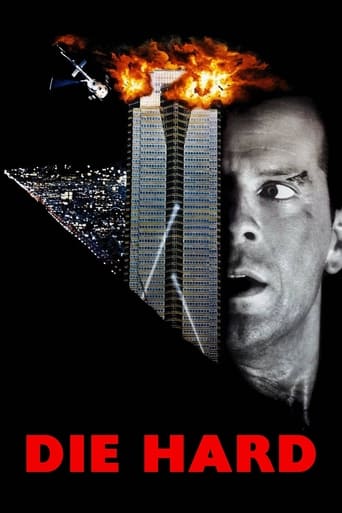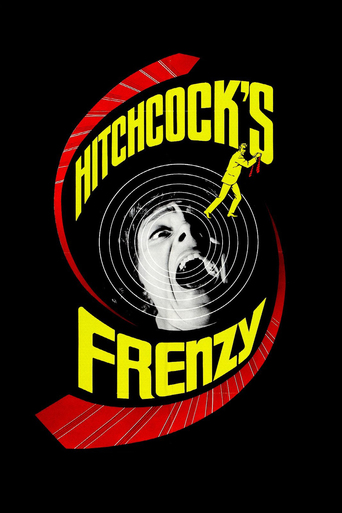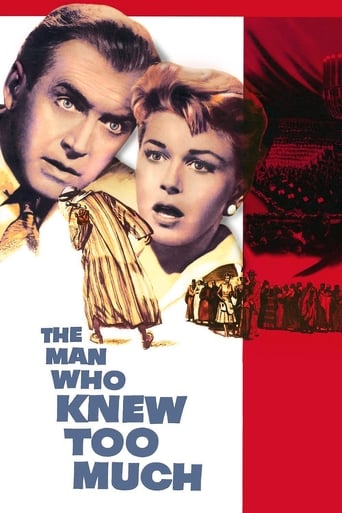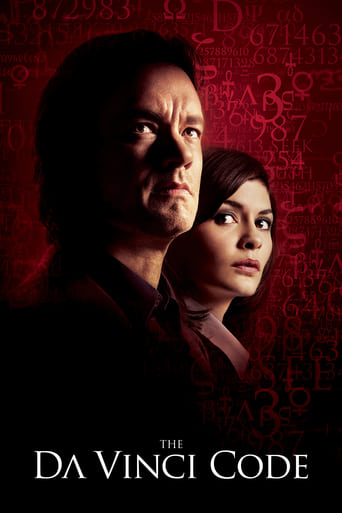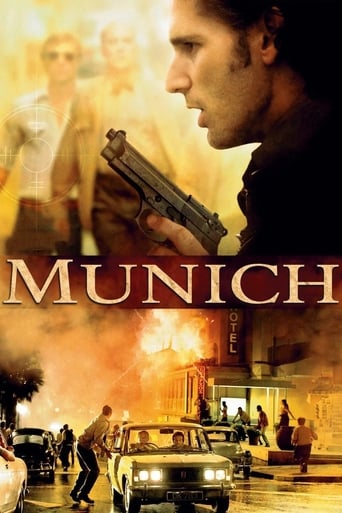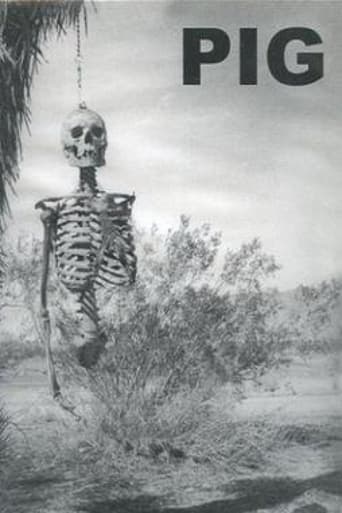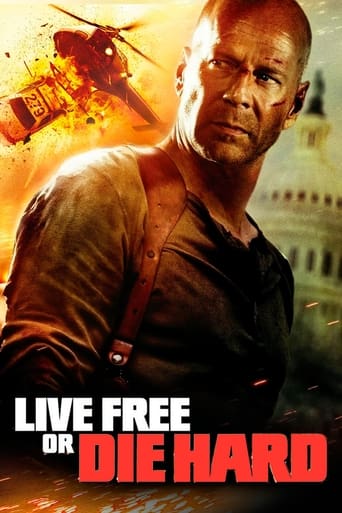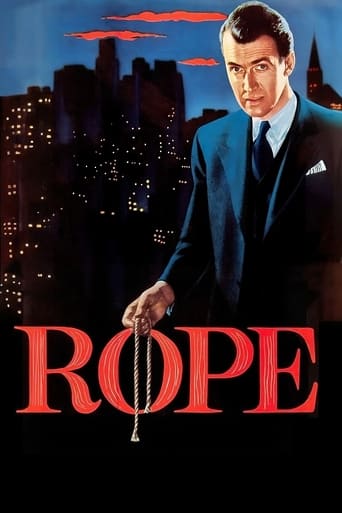The Man on the Eiffel Tower (1949)
A down-and-out student is hired to kill a wealthy woman. When someone else is suspected of the crime, the student taunts police until they realize that they may have to wrong man.
Watch Trailer
Free Trial Channels
Cast


Similar titles
Reviews
To me, this movie is perfection.
Let's be realistic.
Absolutely brilliant
It is so daring, it is so ambitious, it is so thrilling and weird and pointed and powerful. I never knew where it was going.
Executive producers: Irving Allen and Franchot Tone. Copyright 31 December 1949 by Allen and Tone Film Productions, Inc. Made in association with Gray Film. An Irving Allen-Franchot Tone Production, released in the U.S.A. and Australia through RKO Radio Pictures, Inc. New York opening at the Criterion: 28 January 1950. U.S. release: 4 February 1950. U.K. release (through British Lion): 11 December 1950. Australian release: 16 February 1951. U.S. running time: 97 minutes. Australian length: 8,278 feet. 92 minutes.SYNOPSIS: Inspector Maigret outwits a hired killer. Setting: Paris. Time: 1949.COMMENT: Not only is this the only film wholly directed by Burgess Meredith, but at the time it was the only English-language Maigret picture. So The Man on the Eiffel Tower has a double curiosity value that would make it worth seeing even if it deserved its poor reputation.Of course that poor repute is totally undeserved anyway. The script is colorful and exciting and allows for splendid chases through the streets and over the roof tops of Paris, culminating in some amazingly daredevil stuntwork on top of the Eiffel Tower itself. Plucky Burgess Meredith even does many of his own stunts, including a leap from the top of a moving elevator that would do Douglas Fairbanks proud. If his performance is a trifle mannered, he makes up for it in inventive direction (assisted by Cortez's solidly atmospheric lighting) and inspired use of exciting Parisian locations.We have to wait a while for the main stars of this Simenon war of nerves to appear. A few of the lesser players like Hutton, Wallace (looking very glamorous) and Roc set the stage and then on comes Laughton - no Frenchman certainly but still a Maigret to the manner born. You can keep Pierre Renoir and Harry Baur and Jean Gabin. I'll take Laughton's sly, courteous, unflappable, jovial, concerned, conscientious Maigret as proof positive that superior acting overcomes national barriers. The consummate ease and naturalness with which Laughton invests his well-rounded characterization becomes even more apparent when we realize - thanks to the ineptitude of a couple of the other players - that all the dialogue has been post-synched and (in a few glaringly obvious cases) dubbed.Franchot Tone in an unusually unsympathetic role is also most convincing as the intellectual killer - a man who can size up his victim's weaknesses and use them for his own bitter ends.A pity Simenon's original French title, "A Man's Head", was not used. It has a double meaning which perfectly describes this bizarre, fascinating tale. If there be shortcomings in the picturization, they are of a minor, technical nature. The story moves fast, it is directed with considerable flair which makes atmospheric and thrilling use of a whole host of natural Parisian locations (the city is even billed as one of the "stars" of the film), it is edited with breathtaking pungency and is further enhanced by a rousingly suspenseful yet romantic music score by Michel Michelet.
I think many reviews mistakenly treat the film as a complex who-done-it with the plot details confusingly handled and thoroughly patronise director Burgess Meredith without understanding the films true intention. The film is something quite different and perhaps unique.Franchot Tone (Radek)is really excellent as the manic ego-maniac murderer and here's the different and intriguing part - he doesn't try to keep a low profile and evade the investigating policeman, Maigret (Laughton also superb) but instead turns to continually hound him, dog his footsteps, is constantly at his side talking, discussing the case provoking and challenging him. Maigret must live with this intolerable situation in the hope that Radek will betray himself and that he (Maigret) will not betray his own thoughts or the current state of the investigation. Such is the odd relationship that they start to discuss the case as if Radek is a fellow detective. Laughton must keep the game going, keep satisfying Radek's vanity whilst listening, reasoning and trying to trap him.It concludes with a superb chase with something much more - psychological exchanges between Radek and Maigret as to what and where the final moments will be and who will witness them. Radek's wish to in a way triumph, Maigret's humanity in his desire to save the innocent not glory in the death of the guilty but that justice should be done, that he properly acquits himself of his professional duty - to keep his superiors off his back.The story is not I think not a portrayal of reality but a fantasy. It's detective's nightmare of an adversary who is not elusive and secretive but obvious and ever-present, taunting him, boastfully out-thinking him. In real life no murderer taunts the detective to this excruciating degree in effect exposes himself to questioning. I think it is the nightmare of a harassed detective might have when faced with contradictory and insufficient evidence and the sense that the truth and the criminal are tauntingly close but never ever quite close enough.A shame about the colour (some parts appearing like sepia) but these days it is fairly easily improvable. The film is a classic - probably if it had been in black and white it might be seen as suchSeen thanks to Talking Pictures TV
There were various production problems on this picture , including Charles Laughton's menacing to walk off the picture , as he asked leaving if the original director , Irving Allen , threatening to be replaced and Burguess Meredith then carried on the filming . The film happens in Paris , there a dandy named Bill Kirby (Robert Hutton : Invisible invader , Slime people , Vulture) wishes death his aunt , so he can get her inheritance and pay off divorce his spouse (Patricia Roc : Wicked lady , Canyon passage) and marry his lover (Jean Wallace , Cornel Wilde's wife) . A medicine ex-student named Radek (Franchot Tone , also film's producer) is hired to kill the old lady . By night , a knifes grinder , now become thief , named Heurtin (star Burgess Meredith eventually filmmaker) aware the murder but he loses his glasses and he's helped by the assassin . He's framed of killing and then escapes . Meanwhile , Radek is taunting the police and leaving fake clues and banter on Kirby's two women : the wife and lover . Inspector Maigret becomes involved into investigation and swiftly discovers the owner of the thick glasses , though there is no real evidence against him . Then , Inspector Maigret undergoes a cat and mouse game with Radek . It's a battle of wits , an obstinate detective and an intelligent villain , and winds up pitting two rivals against each other in order to destroy themselves . Meanwhile , there are developed pursuits through Paris streets , squares and on rooftops and an exciting chase on the girders of Eiffel Tower.The film is based on Georges Simenon novel about the famous detective Inspector Maigret who is adapted on various cinematic renditions . The movie displays suspense , thriller , action , mystery and results to be quite amusing . Casting is frankly magnificent , Laughton is excellent , as always , as Maigret who is early assigned to the case and quickly tracks down the suspicious ; Tone as a maniac-depressive man is top-notch and magnificent Burguess Meredith as a knife grinder becomes involved with problems , he directed partially the film when Laughton threatened to quit if Burgess Meredith did not take over . Besides , appearing Wilfrid Hyde White as a sympathetic professor and Howard Vernon (Jesus Franco's usual actor) as an Inspector . Numerous problems during shooting , as producer Irving Allen was the original director, but after only three days of shooting , Laughton directed the scenes in which Meredith appeared . Adapted from Georges Simenon's 1931 novel "La Tête d'un homme", his fifth to feature Inspector Maigret . It had already been filmed in France, under its original title, in 1933 . In spite of being splendidly shown streets , squares , monuments from Paris : River Sena , Eliseos Fields , Pigalle , Concorde Square and photographed by expert cameraman Stanley Cortez (Night of hunter , Magnificent Amberson , Secret beyond the door), the cinematography is lousy and faded but the film copy is worn-out , it's necessary an urgent remastering . The motion picture was rightly directed by Burguess Meredith , who replaced director Irving Allen (who was also one of the film's producer) . Allen himself was very dissatisfied with the final results . After its initial run , he bought the film rights back from RKO and kept the prints out of circulation for a long time. Many believed that the film was lost, even Meredith . However, it has been released on VHS and DVD and can be relatively easily found at rental stores . Burguess , subsequently , directed other film titled the ¨Yin and Yang of Mr. Go¨ , as well . The flick will appeal to Charles Laughton fans and intrigue lovers but contains a highly suspense story .
While perhaps not all that good, The Man on the Eiffel Tower is nonetheless entertaining and not nearly as bad as some have offered. Yes, the direction is less than inspiring throughout much of the picture. Burgess Meredith doesn't really seem to get a grasp on creating tension but more importantly some kind of depth for his characters. Charles Laughton, the rotund actor who I personally have never seen give a bad performance, plays the legendary Inspector Maigret from the Georges Simenon novels. I have not read them and therefore an ill-equipped to make any comparisons. I do think Laughton gave the best performance in the film even though, yes, you might say if was a bit off-kilter and subdued even for him. Meredith plays his typical milquetoast individual with workmanlike skill, and Franchot Tone gives at sometimes a very creepy, erratic, unnerving performance as the titular man of the film. The city shots of Paris, though my copy had a somewhat grainy color quality, were impressive and the denouement at the Eiffel Tower easily was the film's most noteworthy attribute. This film was just engaging enough to interest me and it is populated with an above-average cast.

